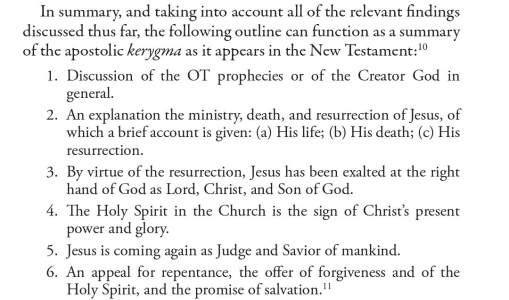Let me start with 308 first and get back to you on 307.No comment on posts 307-308?
First, let me get one thing out of the way: by calling N.T. Wright a “heretic,” I am emphatically not saying that he is going to hell. This has been a special announcement. We now resume our normal programming.
I would say this is still too vague. Churches split for less than important things. Orthodoxy is not defined. And the word heresy itself is more than just a definition: it is emotionally charged and has been weaponized. Perhaps a different term altogether? Or simply start with what's most important: the apostolic kerygma/gospel message.When the dogma in dispute is so important that it breaks up a community, it is a heresy. Those on our side, who reject it, thus “keep the faith,” and are orthodox; the others are heretics.

I would disagree. I don't disagree with justification by faith, but that it is the article by which the church stands or falls. That is the apostolic kerygma (gospel message).Historic evangelical Protestantism has always held that justification by faith alone is the doctrine, or “article [of faith] by which the church stands or falls.”
"For Paul it is not the doctrine of justification that is ‘the power of God for salvation’ (Rom. 1:16), but the gospel of Jesus Christ."
"It is perfectly possible to be saved by believing in Jesus Christ without ever having heard of justification by faith."
"By “the gospel” Paul does not mean “justification by faith.” He means the announcement that the crucified and risen Jesus is Lord. To believe this message—to give believing allegiance to Jesus as Messiah and Lord—is to be justified in the present by faith (whether or not one has even heard of justification by faith). Justification by faith is a second-order doctrine: To believe it is both to have assurance (believing that one will be vindicated on the last day [Romans 5:1-5]) and to know that one belongs in the single family of God, called to share table fellowship with all other believers without distinction (Galatians 2:11-21)."
"But one is not justified by faith by believing in justification by faith, but by believing in Jesus."
Using the apostolic kerygma as the standard for orthodoxy and for comparison, PSA is important didache (teaching) but is exposition that goes beyond the scope of the apostolic kerygma, so it is not a matter of salvation.And essential to any stable doctrine of justification by faith is a proper definition of the object of that faith: the person, nature, and work of the Lord Jesus Christ. Thus penal substitution has stood as an indispensable theological underpinning for the doctrine of salvation as a whole
Using the apostolic kerygma as the standard, Wright’s teaching is orthodoxyWright has twisted all of this beyond recognition. This has made him a heretic within evangelicalism, albeit one of the most popular heretics, especially among evangelical academics, to come along in a long, long time


